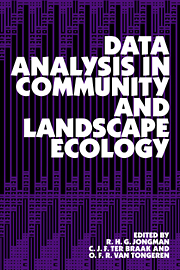Book contents
1 - Introduction
Published online by Cambridge University Press: 11 October 2009
Summary
Types of ecological research
This book deals with the analysis of ecological data. Before going into that it is wise to define the area in which we are working: Ecology is part of biology and deals with the interrelationships between populations, communities and ecosystems and their environment, but draws on knowledge from many other disciplines, for example climatology, physical geography, agronomy and pedology. Odum (1971) prefers the definition ‘Ecology is the study of structure and function of nature’. He stresses the role of ecosystem research in relation to the use of nature by man. Another definition, emphasizing population dynamics, describes ecology as the scientific study of the interactions that determine the distribution and abundance of organisms in nature (Krebs 1978).
Two types of ecological research are autecological and synecological studies. Autecology is the study of one species in relation to its environment, which comprises other organisms and abiotic factors. Synecology, or community ecology, is the study of many species simultaneously in relation to their environment. The number of species or, more generally, taxa concerned can vary from a few to hundreds. For instance, a study on the Black Woodpecker alone belongs to ḁutecology, while a study on forest bird communities including the Black Woodpecker belongs to synecology.
On a larger spatial scale landscape ecology focuses on spatial patterns and the processes related to them; it considers the development of spatial heterogeneity, and spatial and temporal interactions across heterogeneous landscapes. It attempts to answer questions about land-use and land management.
Information
- Type
- Chapter
- Information
- Data Analysis in Community and Landscape Ecology , pp. 1 - 9Publisher: Cambridge University PressPrint publication year: 1995
